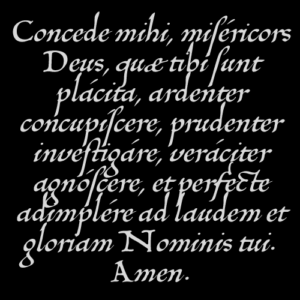 Let us look at the Collect for the upcoming 7th Sunday of Ordinary Time, Novus Ordo.
Let us look at the Collect for the upcoming 7th Sunday of Ordinary Time, Novus Ordo.
Praesta, quaesumus, omnipotens Deus,
ut, semper rationabilia meditantes,
quae tibi sunt placita, et dictis exsequamur et factis.
Note the spiffy separation of et dictis…et factis by the verb. Rationabilis is an adjective meaning “reasonable, rational”.
A Biblical source for part of the oration could be John 8:28-29:
So Jesus said, “When you have lifted up the Son of man, then you will know that I am he, and that I do nothing on my own authority but speak thus as the Father taught me. And he who sent me is with me; he has not left me alone, for I always do what is pleasing to him (quae placita sunt ei, facio semper).”
SLAVISHLY LITERAL VERSION:
Grant, we beg, Almighty God,
that we, meditating always on rational things,
may fulfill those things which are pleasing to You
by both words and deeds.
I chose “rational” partly because of an association I made with a prayer attributed to St Thomas Aquinas which we students, trying to be serious and rational beings (cf. Aristotle, Nichomachean Ethics 1,13 ), recited before philosophy classes:
Concede mihi, miséricors Deus, quae tibi sunt plácita, ardenter concupíscere, prudenter investigáre, veráciter agnóscere, et perfecte adimplére ad laudem et gloriam Nominis tui. Amen. …
Grant me, O merciful God, to desire eagerly, to investigate prudently, to acknowledge sincerely, and perfectly to fulfill those things which are pleasing to Thee, to the praise and glory of Thy Name. Amen.
When we submit to God’s will and pursue what is good and true and beautiful, we are as God wants us to be.
OBSOLETE ICEL (1973):
Father,
keep before us the wisdom and love
you have revealed in your Son.
Help us to be like him
in word and deed.
Dreadful. Good riddance.
CURRENT ICEL (2011):
Grant, we pray, almighty God,
that, always pondering spiritual things,
we may carry out in both word and deed
that which is pleasing to you.
I chose “rational things” for rationabilia. The newer, corrected ICEL has “spiritual things”, which is certainly defensible. The French language dictionary of liturgical Latin by Albert Blaise revised by Antoine Dumas, for rationabilis, gives us “spirituel”. Blaise/Dumas also cites the ancient version of the very Collect we are looking at today, identifying it for the 6th Sunday after Epiphany in the 8th century Gregorian Sacramentary.
We are creatures made in the image and likeness of God. We are made to act like God acts, using the gifts and powers of intellect and will He gave us. These faculties are wounded because of Original Sin, but they still separate us from irrational animals. Thus, we can distinguish between “acts of humans” (such as breathing and digesting) that are not much different than what brute animals do except that a human does them, and human acts (like painting, repairing a car, conversing, choosing to love) which involve the use of the higher faculties. We must be interiorly engaged and focused with mind and will on the action we, as agents in God’s image, are carrying out.
This is important for understanding “active participation” in the liturgy.
Many people think “active participation” means carrying things around, clapping, singing, etc. We can do all those things and actually be thinking about the grocery list or wondering what the score of the game is. We all have the experience of catching ourselves whistling without have realized we were doing it, reading and not remembering what we just read. We are doing something, but we are not acting as “humanly” as we ought.
That is not the kind of participation we need at Mass.
We must be actively receptive to what is taking place in the sacred action of the liturgy. Watching carefully and quietly, actively receptive listening to the spoken Word or to sacred music, can be far more active than carrying things around, and so forth. Active receptivity requires concentration and desire, mind and will. It looks passive, but it isn’t. We actively submit to Christ, the true actor in the Mass, and we actively receive from Christ. He gives us what we need, not as if to passive animals, but as to His actively receptive and engaged images.
Inner participation leads to outward expression. The outward can also spark the inward. The former, however, has logical priority over the latter.
Participation at Holy Mass in the Extraordinary Form can help us recover a deeper, fuller, more conscious and proper active participation in the Ordinary Form of the Roman Rite. This is also why our priests must always be faithful to the official texts and rubrics.
Oh… one more thing.
The most perfect form of active participation is the reception of Holy Communion in the state of grace.
IN THE STATE OF GRACE… and not just when people give themselves permission because of their “conscience”, which can be deceived in self-deception.
Let us be pleasing to GOD and not only to ourselves.
Hence, GO TO CONFESSION!


































The most perfect form of active participation? Tambourines. There’s not even a close second. You can literally FEEL the #SpiritofVaticanII coursing through your veins. One of the most glaring deficiencies I’ve detected in the Tridentine Mass is that it’s virtually impossible to incorporate tambourines anywhere into the TLM.
Thanks Father, these are always the best posts. (Have you ever considered compiling all of your posts on the collects, past and present, into a book?)
Very interesting connection between the words ‘spiritual’ and ‘rational.’ It definitely makes sense, especially with regard to the higher faculties, but I don’t think I would have ever imagined they could both be valid translations of the same word.
Very rhythmic prayer.